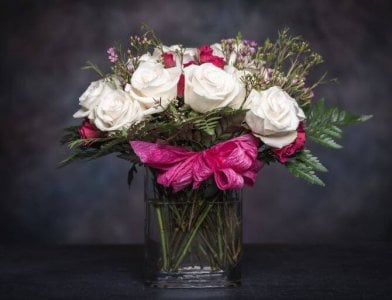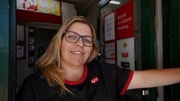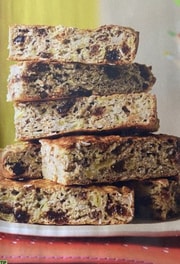Support farmers this Valentine's Day – buy local flowers
- Replies 1
Love is in the air! As Valentine’s Day approaches, what better way to show your love for your special someone than with a stunning bouquet of beautiful blooms?
But before you take a trip to your local supermarket for a bouquet, Aussie flower farmers have a message for all the loved-up couples out there: buy local!
With this being one of the busiest times of the year for the flower industry, growers are reminding Australians to make sure they’re buying blooms grown locally rather than buy imported stems from overseas.
It is estimated that 10 million rose stems will arrive in the country ahead of the holiday.
Anna Sfyris, Owner of 302 Flowers, said she supplies hand-cut flowers to wholesalers and the public.
‘When the flower is ready, we cut it. It’s not languishing on a shelf somewhere, the freshest you can get it from a farm,’ she explained.
She added that with imported flowers, there may be some issues that come with them as they are often fumigated. Meanwhile, flowers grown locally are ‘chemical-free and support the local economy’.
‘We need people to support local, and from COVID, we have learned that we have to support our local businesses,’ she stated.
According to Flower Industry Australia Director Sal Rosso, the flower industry improved through the pandemic, and the rise of flower farming has spread right across Australia. It was reported that it was the strongest the local industry had ever been.
‘Australians locked up at home took the opportunity of ordering flowers online and florists were particularly busy during that time,’ Mr Rosso shared.
Mr Rosso also stated that, historically, the local flower industry has struggled to compete with cheaper imported flowers.
‘The pandemic has resulted in the local flower industry being revitalised after being totally devastated in the early 2000s when cheap imports were dominating supermarkets,’ he shared before adding that local farmers couldn’t compete with flowers coming from Kenya, Asia, and South America.
Mr Rosso also suggested that florists are moving away from imported flowers as locally-grown blooms are becoming cheaper and higher quality.
He added that consumers don’t realise that the imported product is required to be dipped in round-up for a certain period of time, and a minimum of 5 centimetres under the bud.
‘You really kill the plant – so we're finding florists becoming more drawn to local product. Also, with current freight rates, it's not competitive to bring in imported flowers anymore.’
The high demand for locally-grown flowers led to new investments in farms which would result in better-quality buds. This shift positively impacted the enthusiasm of local farmers, because they have been able to sell their products to consumers.
‘So many growers have invested hundreds of millions of dollars into new infrastructure, new farms, new varieties so we are seeing more growers being established in Australia.’
In an effort to steer people away from imported blooms, advocacy groups also want ‘country of origin’ stickers placed on bouquets.
Anna Jabour of the Flower Association of Australia said: ‘We know consumers want to know where flowers come from, it makes common sense.’
She advises that consumers should buy only what’s in season, and to ask the florist where each stem was grown to find out if they’re buying locally-grown flowers.
This advice is also backed up by the ACCC after they launched an investigation into the florist industry around this time last year.
‘The ACCC is urging consumers buying flowers this Valentine’s Day to ask where their flowers are coming from and make sure they are not being misled into thinking large “order gatherers” are locally-based florists,’ it said in a notice.
They mentioned that some large businesses either create floral arrangements themselves in large distribution centres or outsource orders to local businesses after charging undisclosed commissions.
ACCC Deputy Chair Delia Rickard said: ‘Consumers are often willing to pay premium prices at local florists in the hope they will get fresh flowers, a direct point of contact and reliable delivery. When national order gatherers use suburb-specific information in their online digital marketing, it may mislead a consumer into thinking they are dealing with a small local business.’
When ordering flowers online or over the phone, the ACCC recommends that consumers:
 Do you buy local? Have you ever gotten a local bouquet? Share your pictures with us in the comments below!
Do you buy local? Have you ever gotten a local bouquet? Share your pictures with us in the comments below!
But before you take a trip to your local supermarket for a bouquet, Aussie flower farmers have a message for all the loved-up couples out there: buy local!
With this being one of the busiest times of the year for the flower industry, growers are reminding Australians to make sure they’re buying blooms grown locally rather than buy imported stems from overseas.
It is estimated that 10 million rose stems will arrive in the country ahead of the holiday.
Anna Sfyris, Owner of 302 Flowers, said she supplies hand-cut flowers to wholesalers and the public.
‘When the flower is ready, we cut it. It’s not languishing on a shelf somewhere, the freshest you can get it from a farm,’ she explained.
She added that with imported flowers, there may be some issues that come with them as they are often fumigated. Meanwhile, flowers grown locally are ‘chemical-free and support the local economy’.
‘We need people to support local, and from COVID, we have learned that we have to support our local businesses,’ she stated.
According to Flower Industry Australia Director Sal Rosso, the flower industry improved through the pandemic, and the rise of flower farming has spread right across Australia. It was reported that it was the strongest the local industry had ever been.
‘Australians locked up at home took the opportunity of ordering flowers online and florists were particularly busy during that time,’ Mr Rosso shared.
Mr Rosso also stated that, historically, the local flower industry has struggled to compete with cheaper imported flowers.
‘The pandemic has resulted in the local flower industry being revitalised after being totally devastated in the early 2000s when cheap imports were dominating supermarkets,’ he shared before adding that local farmers couldn’t compete with flowers coming from Kenya, Asia, and South America.
Mr Rosso also suggested that florists are moving away from imported flowers as locally-grown blooms are becoming cheaper and higher quality.
He added that consumers don’t realise that the imported product is required to be dipped in round-up for a certain period of time, and a minimum of 5 centimetres under the bud.
‘You really kill the plant – so we're finding florists becoming more drawn to local product. Also, with current freight rates, it's not competitive to bring in imported flowers anymore.’
The high demand for locally-grown flowers led to new investments in farms which would result in better-quality buds. This shift positively impacted the enthusiasm of local farmers, because they have been able to sell their products to consumers.
‘So many growers have invested hundreds of millions of dollars into new infrastructure, new farms, new varieties so we are seeing more growers being established in Australia.’
In an effort to steer people away from imported blooms, advocacy groups also want ‘country of origin’ stickers placed on bouquets.
Anna Jabour of the Flower Association of Australia said: ‘We know consumers want to know where flowers come from, it makes common sense.’
She advises that consumers should buy only what’s in season, and to ask the florist where each stem was grown to find out if they’re buying locally-grown flowers.
This advice is also backed up by the ACCC after they launched an investigation into the florist industry around this time last year.
‘The ACCC is urging consumers buying flowers this Valentine’s Day to ask where their flowers are coming from and make sure they are not being misled into thinking large “order gatherers” are locally-based florists,’ it said in a notice.
They mentioned that some large businesses either create floral arrangements themselves in large distribution centres or outsource orders to local businesses after charging undisclosed commissions.
ACCC Deputy Chair Delia Rickard said: ‘Consumers are often willing to pay premium prices at local florists in the hope they will get fresh flowers, a direct point of contact and reliable delivery. When national order gatherers use suburb-specific information in their online digital marketing, it may mislead a consumer into thinking they are dealing with a small local business.’
When ordering flowers online or over the phone, the ACCC recommends that consumers:
- Check for a physical address when searching online and ask the business where their operations are located.
- Search for reviews on external review websites such as Product Review.
- Check a local business’s social media pages.
- Ask where the flowers are grown.
Key Takeaways
- Flower farmers are encouraging Aussies to buy local flowers for Valentine’s Day.
- It is estimated that 10 million rose stems will be imported for the holiday.
- Locally grown flowers are chemical-free and support the local economy.
- Flower advocacy groups are also asking for 'country of origin' stickers to be placed on bouquets.









